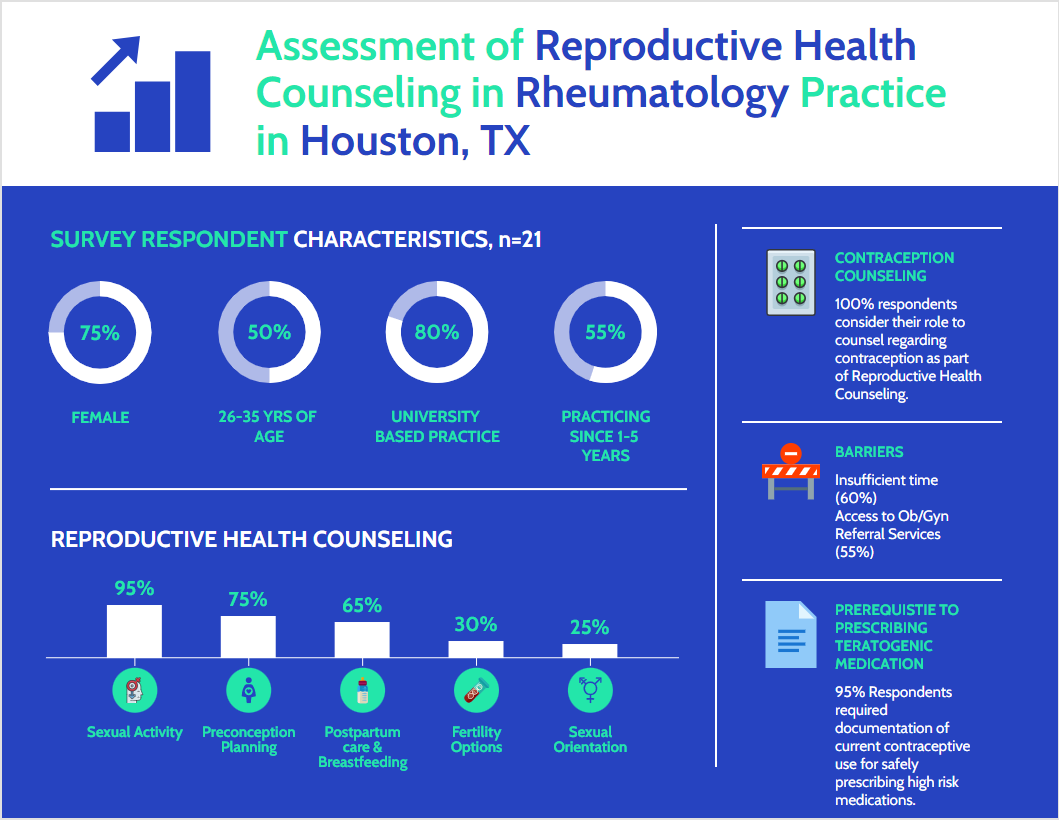Session Information
Session Type: Poster Session A
Session Time: 9:00AM-11:00AM
Background/Purpose: Many rheumatic diseases disproportionately affect women of childbearing age. Advances in the field of rheumatology have led to an increase in targeted treatment agents. Many of these agents have known adverse effects on pregnancy and the developing fetus. At this crossroads of rheumatology and reproductive health, outcomes can be improved by proper planning and education. Guidelines for contraception use based on disease states are available; however, very few studies have evaluated the current rates of contraception counseling and family planning services made available to patients receiving rheumatological care. There are multiple barriers to health care delivery, and with the change in the recent legislature affecting access to abortion services, we hypothesize that more barriers may have been added. We aim to describe current practices for reproductive health counseling in practicing rheumatologists in academic affiliated institutions and describe the barriers to providing such care through an electronic survey.
Methods: A cross-sectional survey designed in REDcap was sent to rheumatologists in the city of Houston associated with academic institutions. The survey inquired about physician demographics, practice characteristics, knowledge and beliefs regarding reproductive health counseling and physician-reported barriers to providing reproductive health. The information from the survey was extracted as de-identified data and analyzed using REDcap.
Results: 59 participants were approached via e-survey. Of the 21 survey responders (35.6%), most were between 26-45 years of age, female physicians in university-based practice. The providers reported they see on an average >30 patients in a week with 25 to 50% these patients being female of reproductive age group. All providers reported it is their role to ask about sexual activity and contraception use. About 60% of physicians reported counseling regarding postpartum and breastfeeding as a part of reproductive health counseling. Only one third (28.6%) considered counseling regarding fertility as part of their role in reproductive health counseling. Most providers (90.5%) reported documentation of current contraceptive use as a requirement before initiation of teratogenic medication – with the same requirement for refill. The common barrier to provide reproductive health counseling was time (61.9%) and the second most common barrier reported was access to OBGYN services (57.1%). Most providers (42.9%) reported medico-legal implications as a barrier since the ruling, while 38.1% noted no changes in barriers since the ruling.
Conclusion: The survey suggests Houston rheumatologists consider reproductive health counseling as an integral part of their role with focus on pregnancy planning, breastfeeding, and postpartum care. Fertility counseling is not considered part of routine counseling. 38.1% respondents noted lack of change in practice or barriers following the legal ruling, which indicates there are existing barriers in the system, which can be optimized to provide comprehensive reproductive counseling. A follow up interview with select survey respondents is planned to define these barriers, beliefs and practices.
To cite this abstract in AMA style:
Desai R, Subash M. Assessing Reproductive Health Counseling and Provider Attitudes in Rheumatology Post Roe v. Wade in Houston, Texas [abstract]. Arthritis Rheumatol. 2023; 75 (suppl 9). https://acrabstracts.org/abstract/assessing-reproductive-health-counseling-and-provider-attitudes-in-rheumatology-post-roe-v-wade-in-houston-texas/. Accessed .« Back to ACR Convergence 2023
ACR Meeting Abstracts - https://acrabstracts.org/abstract/assessing-reproductive-health-counseling-and-provider-attitudes-in-rheumatology-post-roe-v-wade-in-houston-texas/

